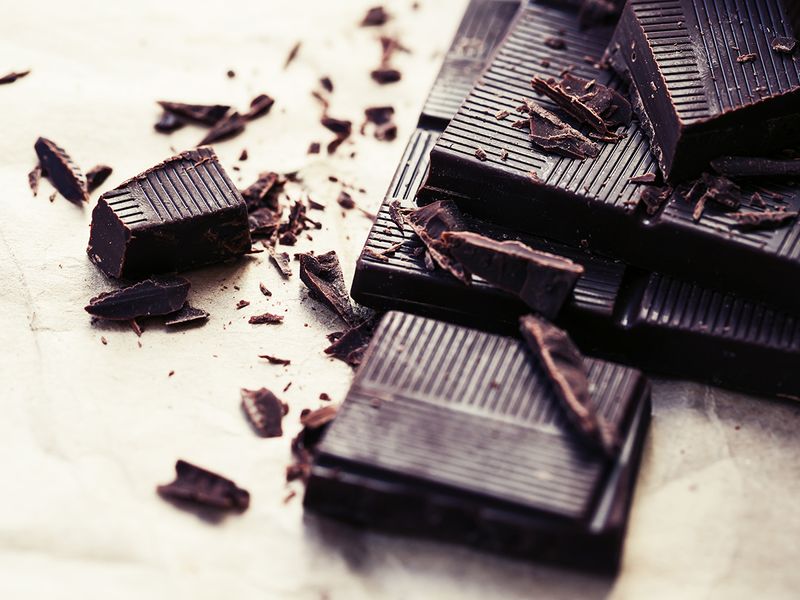
Who doesn't crave that velvety cascade of pure joy known as chocolate? But alas, this decadent delight often gets cast as a villain, blamed for breakouts and long-term woes.
Prepare to celebrate! Chocolate, believe it or not, can actually be a source of health benefits.
Ready to indulge guilt-free? Buckle up, chocoholics, because we're about to unwrap the surprisingly healthy side of chocolate!
‘A treasure trove of antioxidants’

As experts maintain, if chocolate is chosen wisely and enjoyed in moderation, it can be a treat for both the taste-buds and overall well-being.
"Dark chocolate is a treasure trove of antioxidants, such as flavonoids, primarily found in cocoa. These antioxidants have been associated with improved heart health by helping to lower blood pressure and enhance vascular function," explains Sushma Ghag, a dietician specialist at Aster Healthcare. Studies show they can reduce blood pressure, improve blood flow, minimise the risk of clotting, and even lower your risk of stroke, coronary heart disease, and death from heart disease, she adds. That’s not all that flavanoids do: They also protect the immune system from inflammation, which is often linked to several illnesses.
The flavanoids stimulate endothelium, which is the lining of arteries to produce more nitric oxide (NO). NO sends messages to the arteries, which tells them to relax and widen. This relaxation lowers the resistance to blood flow, which ultimately translates to lower blood pressure.
A 2015 study titled High-cocoa polyphenol-rich chocolate improves blood pressure in patients with diabetes and hypertension, published in the US-based National Library of Medicine, investigated the effects of chocolate consumption in 60 people with Type 2 diabetes and high blood pressure. The study observed that the participants who ate 25 grams of dark chocolate daily, had significantly lower blood pressure than those who ate the same quantity of milk chocolate.
More antioxidant activity than fruits?
Is dark chocolate healthier than fruits? It seems so.
In fact, a 2011 study titled Dark chocolate better than acai berry, blueberry, cranberry for antioxidants, published in the US-based Chemistry Central Journal, showed that cocoa and dark chocolate had more antioxidant activity, polyphenols and flavanoids than any other fruit tested, including blueberries and açai berries. The study also found the total flavonol content of cocoa powder, which is 30.1 milligrams per gram, was significantly higher than all other fruit powders tested, which averaged at less than 10 milligrams per gram.
Dark chocolate also had the highest total flavonol content per serving at more than 500 milligrams, which was followed by a cocoa beverage at about 400mg. The fruit juices, which included acai, blueberry and cranberry had less than 200 milligrams per serving of this type of antioxidant.

Clearly, dark chocolate ranks higher than milk chocolate for good reason. Milk chocolate contains cocoa butter, sugar, milk and small quantities of cacao, according to Tamara Alizeh, a clinical dietician based in Dubai. So, in contrast, dark chocolate has more nutritional benefits, as it has less sugar than milk chocolate.
Battling diabetes
Dark chocolate possesses more several secrets within its sweet makeup: It can pack a powerful punch against blood pressure owing to two ingredients, epicatechin, a powerful compound that also strengthens cells, and polyphenols.
Epicatechin also supports the body’s utilisation of insulin, which is constructive against diabetes, says Alizeh. Meanwhile, the polyphenols also enhance insulin sensitivity, which can control blood sugar. This level of insulin sensitivity could even delay or prevent diabetes in the long run.
According to a 2016 study published in the US-based academic journal Appetite, people who ate dark chocolate, at least once a week, had a lower prevalence of diabetes. They were also at a lower risk of diabetes, four to five years later. After studying 908 non-diabetic people and 45 people with diabetes, it was discovered that people who consumed dark chocolate at irregular intervals, were at twice the risk of diabetes, as compared to those who ate it more than once a week.
Cognitive benefits
It’s not just good for the heart; it powers up your brain too.
As Ghag explains, dark chocolate has been linked to several potential cognitive benefits. “The flavonoids that are abundant in cocoa, have been associated with improved cognitive function, and can even offer protection against age-related decline,” she says. Chocolate can stimulate neural activity in particular areas of the brain, which are responsible for pleasure and reward. This can help in toning down the stress and boosting your mood.

The flavonoids that are abundant in cocoa, have been associated with improved cognitive function, and can even offer protection against age-related decline...
Over the past decade, there has been much research on how eating dark chocolate can boost neuroplasticity, which is the brain’s ability to form synaptic connections. A 2018 study titled Dark chocolate consumption reduces stress and inflammation, published in the US-based National Library of Medicine, demonstrated this quality of dark chocolate, asserting that it improved mood, memory and cognition.
Another 2018 study on dark chocolate published in the US-based The Faseb Journal, found that memory and learning could be fuelled by chocolate consumption. The flavonoids tend to accumulate in the areas that are responsible for these functions. However, research is still ongoing.
What to consider when eating dark chocolate
As both Alizeh and Ghag recommend, choose dark chocolate with at least 70 per cent cocoa content. “It’s best to savour it in moderate portions to avoid excessive caloric intake,” says Ghag.
Be warned, it isn’t some magical fix: It also contains calories and fats, so be mindful of your intake. Each brand is processed differently, so it always helps to do research before eating dark chocolate.









